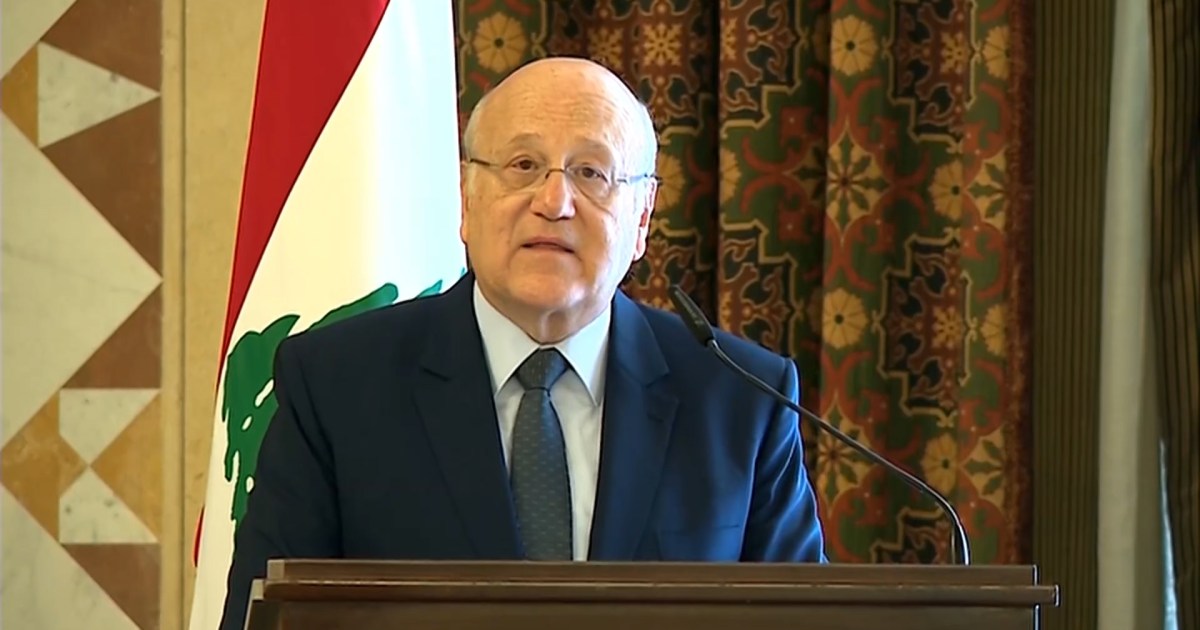Lebanese Prime Minister Najib Mikati reiterated his call on Information Minister George Kordahi to "arbit his conscience" and give priority to the national interest, against the backdrop of the crisis raised by the latter's statements with the Gulf states, especially Saudi Arabia.
But the minister insisted on refusing to resign, while Hezbollah blamed Riyadh for the crisis, rejecting foreign dictates on the government, as he put it.
Meanwhile, France called for Lebanon to be kept away from broader regional crises, and urged Lebanese officials and regional powers to calm down, while the US State Department called on Beirut to maintain channels of dialogue with the Gulf states.
In a televised speech on Thursday, Mikati said that the personal positions of the Minister of Information had brought Lebanon into the "prohibition of boycott" by the Gulf countries, and he continued, "Whoever thinks that he can take Lebanon away from its Arab depth is mistaken."
The Lebanese Prime Minister spoke of a "road map" to get out of the crisis, saying that the government is determined to address the file of the relationship with Saudi Arabia and the Gulf states according to the correct rules, and that it will not leave the matter "subject to political compromise." The solution".
Mikati's speech came after talks he held with Lebanese President Michel Aoun at Baabda Palace on Thursday. The presidency said that he and Aoun discussed "ways to get out of the current crisis, and they agreed on a road map."
As for Qardahi, Lebanese media reported that he is waiting for Prime Minister Najib Mikati to know the positions of Arab and foreign officials, stressing that he will not resign and that he has not changed his position.
Commenting on the Lebanese Prime Minister's statements, "Lebanese Forces" party leader Samir Geagea said that Prime Minister Najib Mikati's position is responsible and courageous, and added that others should respond to Mikati with the minimum responsibility and patriotism to spare Lebanon additional tragedies, as he put it.
Hezbollah's position
For its part, the Hezbollah parliamentary bloc said that it renews its support for the Lebanese Minister of Information, and added that it holds Saudi Arabia responsible for creating the latest crisis with Lebanon, rejecting foreign dictates on the government, as it put it.
Naim Qassem, Deputy Secretary-General of the Lebanese Hezbollah, described the Saudi actions towards his country as "unjustified aggression", calling on Riyadh to apologize.
Qassem said - in a televised interview - that Saudi Arabia is working in the wrong way, because no one can twist the arm of Hezbollah and the Lebanese people, as he put it.
He stressed that Lebanon is not a "stick-breaker", and deals with Saudi Arabia in equality and as an independent country.
international interactions
In the international interactions of the crisis, France called on the main parties in the region to play their role in forcing Beirut to implement reforms, and to get it out of the impasse in which it was stuck.
On Thursday, a spokeswoman for the French Foreign Ministry, Anne-Claire Legendre, said that she was in contact with all parties, and urged Lebanese officials and regional powers to calm the situation.
The spokeswoman added to reporters in a daily briefing that "disassociating Lebanon from regional crises is extremely important... In this context, Lebanon must be able to rely on all its partners in the region to help it out of the crisis."
The United States also expressed hope that Saudi Arabia and the Gulf states would restore relations with Lebanon, and expressed understanding for Riyadh's concerns.
"Our position is that diplomatic channels must remain open if we are to seek to improve the humanitarian conditions of the Lebanese people," State Department spokesman Ned Price told reporters.
The US statement comes a day after US Secretary of State Anthony Blinken met with Lebanese Prime Minister Najib Mikati, on the sidelines of the United Nations Climate Summit in Glasgow.
Price made it clear that Washington had no position on whether Minister Qardahi should remain in his post, but it did express its understanding of Saudi concerns.
"The idea that the Houthis do not represent a destabilizing force and a force that has caused additional suffering to the people of Yemen, is an idea that we do not support," he added.
worst disagreement
Lebanon is facing what is described as its worst dispute with the Gulf states, as a result of statements made by the Lebanese Minister of Information, George Kordahi, regarding the war in Yemen before his appointment to the government.
Qardahi said - in an interview broadcast last October 25, which was recorded weeks before his appointment as a minister - that the Houthis in Yemen are defending themselves in the face of what he sees as an external aggression from Saudi Arabia and the UAE.
As a result, Saudi Arabia recalled its ambassador to Beirut and asked the Lebanese ambassador to leave Riyadh and decided to ban all Lebanese imports. Bahrain, Kuwait and the UAE also took some similar steps.
Arab and international contacts were held to contain the crisis, and the Lebanese president affirmed his keenness to establish the best relations with Saudi Arabia.

